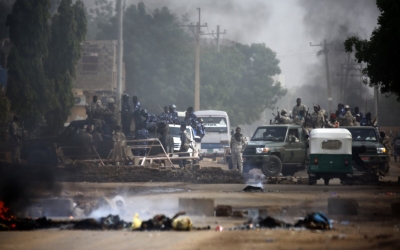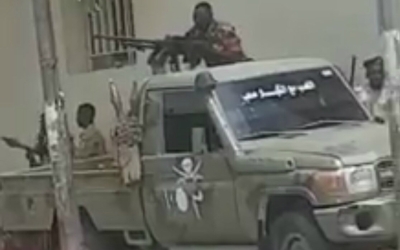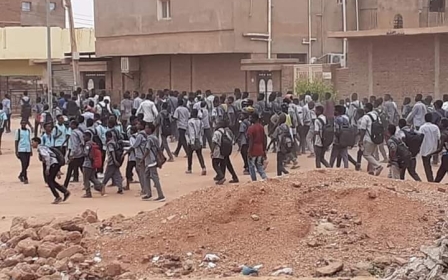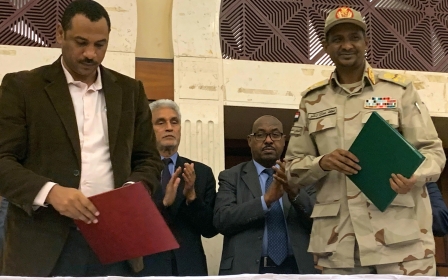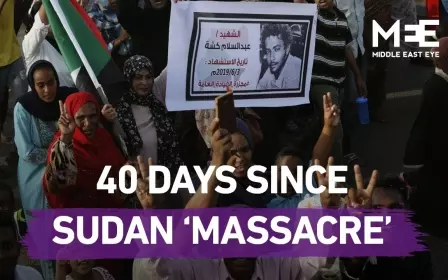Sudan detains nine members of RSF security force over El-Obeid killings

Sudan's military council spokesman said on Friday that nine members of the Rapid Support Forces (RSF) have been dismissed and detained in connection with recent violence in the cities of Omdurman and El-Obeid.
Lieutenant General Shams El Din Kabbashi added that the governor of North Kordofan state and its security council will be held accountable for the killing of six people including four schoolchildren in the state capital El-Obeid on Monday.
Hundreds of thousands took to the streets on Thursday in response to the killings, and opposition medics said four protesters were killed and many injured by gunfire in Omdurman.
Kabbashi spoke at a news conference following a night of negotiations with opposition groups over a constitutional declaration, a document that would pave the way for a transitional government.
The two sides had signed a political deal in July setting a three-year transition period and a joint sovereign council, but talks over the constitutional declaration were called into question earlier this week.
New MEE newsletter: Jerusalem Dispatch
Sign up to get the latest insights and analysis on Israel-Palestine, alongside Turkey Unpacked and other MEE newsletters
Mohamed Hassan Lebatt, the African Union mediator for Sudan, said the talks were set to continue on Friday night.
Mass demonstrations
Demonstrators came out on Thursday for a million-person march in cities across Sudan in response to the killings in El-Obeid earlier this week.
"The police started firing tear gas [against protesters] and later bullets were fired from different directions," the Sudanese Professionals Association (SPA), one of the main protest groups, said in a statement on Thursday.
"Still… we stress that the killings and bullets that are confronting the Sudanese people will not stop them from reaching their goals and holding on to their peaceful revolution," the group added.
The demonstrations are part of a months-long movement aimed at establishing a civilian-led government to replace the Transitional Military Council (TMC) that took over in April after the army overthrew long-time autocrat Omar al-Bashir.
The opposition is also calling for an end to the food shortages and economic hardships that triggered the unrest in the first place.
While negotiations between the opposition and military leaders have been ongoing in the past few weeks, protesters have continued to gather, pressing the army to hand control over to civilians.
Resolving negotiations
In July, the two sides signed an agreement that secured a three-year transition period and established a joint sovereign council with a rotating leadership. But talks over the wording of a constitutional declaration on the changes had caused a roadblock.
Still, following the latest round of negotiations on Thursday, opposition leaders said they had resolved major sticking points and were closer to a deal.
"The agreement is really now just around the corner," Satea al-Hajj, a leader in the Forces of Freedom and Change (FFC) coalition of opposition groups, said in a news conference in Khartoum on Thursday, as reported by Reuters.
The opposition is also demanding that members of the new joint sovereign council not be granted blanket immunity from prosecution for past crimes.
On Thursday, FFC leaders said they had agreed for members to be granted "procedural immunity" - meaning they could be tried only with the approval of two-thirds of the legislative council, Reuters reported.
The opposition leaders said both sides also agreed to another key point, reaffirming that the parties included in the FFC would make up 67 percent of the yet to be established legislative council.
The remainder of the seats would be taken up by other opposition and political groups.
Sudan's ruling military council did not immediately confirm the details of the agreements.
Middle East Eye delivers independent and unrivalled coverage and analysis of the Middle East, North Africa and beyond. To learn more about republishing this content and the associated fees, please fill out this form. More about MEE can be found here.


